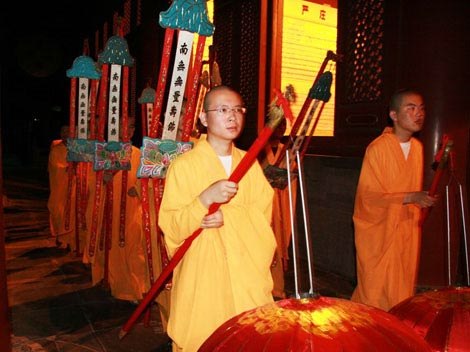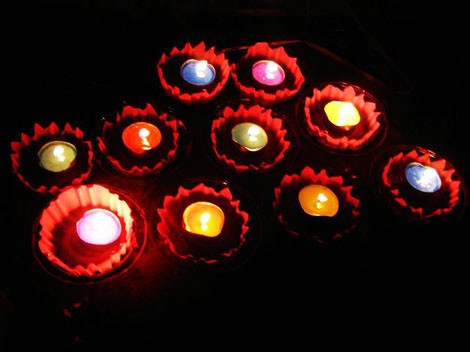
The Hungry Ghost Festival of Chinese Taoism is also the Ullambana Festival of Buddhism. Commonly called "Ghost Festival" or "Mid-July Festival", it falls on the fifteenth of every lunar July.

In ancient Chinese folk culture, people believe lunar July is a month for ghosts, something like Western culture's Halloween. It is believed that the gates of hell are thrown open, releasing hungry ghosts to wander on the earth in search of food. So people light up lanterns on roadsides, put lanterns in the river and provide shoes for the convenience of the ghosts. And some people pray for their ancestors to bless later generations.
In Taoist culture, grand rituals are held in temples on the Ghost Festival, the fifteenth of lunar July, to pray for good fortunes for the people and for blessing and warding off evil for the ghosts. In Buddhist culture, "Ullam" means "hanging upside down" in Sanskrit; "bana" means "a vessel for holding offerings of food". Buddhists hold that the vessel is capable of removing the extreme suffering of one's deceased parents in purgatory. This originates from the story of "Monk Mulian Saving His Mother" in Buddhist sutras. Buddhist disciples set Ullambana all over the place, symbolizing food provision for the people, adding fortune and longevity to their living parents and releasing deceased parents from sufferings.
The Ghost Festival celebrated among ordinary people is amazingly similar to the Hungry Ghost Festival and the Ullambana Festival in terms of spiritual essence. They are all under the theme of "respecting parents, honoring the elderly and blessing the people". These festivals are combined to have formed the present-day Hungry Ghost Festival.
Today, the Hungry Ghost Festival is a grand folk festival with cultural richness and features sacrifice offering to the dead and ghosts, suffering relieving and forgiveness of sins. One of the most important customs is floating lanterns on the river. The lanterns are usually made of paper, in the shape of a lotus flower, with a light or candle at the bottom. They are put on the river to drift wherever possible, serving as guiding lights for wandering ghosts. Meanwhile, various activities for ancestor worshiping are held everywhere, such as repentance chanting, giving food to starving ghosts and staging operas for the occasion.
Traditional Ghost Festival puts emphasis on filial piety and philanthropy. It no longer has religious meanings, just a festival for remembering ancestors and relatives passed away and for family gathering.





